Sell online: Your own e-commerce store vs. marketplaces
Ecommerce
313 week ago — 12 min read
According to Statista, revenue through e-commerce in India is expected to grow to $62.3 billion in 2023. We are at the cusp of an e-commerce revolution that will completely change the way business owners and entrepreneurs market and sell their products. Isn’t it interesting to see how quickly the world has evolved and almost everything today is accessible online? And while most of us have been consumers online, selling online is a topic that has garnered much interest over the past few years.
Selling online can indeed be daunting. There are so many questions to be answered – Why? How? And most importantly, Where?
Before we get into the nitty-gritty of selling online, here is an interesting case study that would address many unanswered questions for you:
Artchetype Studio, a stationary brand based out of Mumbai, exclusively sells online through their own e-commerce store. The first year they introduced their annual planners, they sold 100 pieces, 1000 in the following year and 2,500+ in the most recent year, their peak season sale being 3,000 annual planners (each priced at about INR 2,000) with minimal to zero marketing dollars. Shivali, the promoter and chief designer of Artchetype, started by selling her products on a marketplace. But soon enough she realised that while her customers were increasing, her profits were dipping. On a closer look, she learnt the following:
- Number of returns was significantly high, which was coming at a cost to her, as she had to fund the shipping cost of delivery and return. But worst still, most returned products were unsalable thereafter.
- The one aspect that came as a shock to her - she realised that the marketplace she was selling on was discounting her product way below her price to them and this was impacting her relationship with her direct customers and the image of her products, which she had built to be high-end and premium.
So finally she set up her own e-commerce store and started reaching existing and new customers through her social media accounts (with the biggest focus on Instagram). Now instead of paying for return packages, she allocated the same budget towards gifting her stationery items to influencers who would post her products with a link to her store. Her expected revenue for 2019 is INR 1 crore+ by sales of a single product via her own website.
Selling on your own e-commerce site is more like having a standalone store. You can curate your own space, design the theme and look based on what you are selling.
This brings us to today’s topic - Selling online: your own e-store vs. marketplace
Also read: Wondering if you should build your own e-commerce website or not?
Why sell online?
Did you know that there are more than 90 million online shoppers in India today—eight times more than in 2013. So as Jamie Shanks, CEO Sales for Life says - “It’s time to go where your buyers live: online.” If you are an existing business or a new one, selling online gives you the following benefits:
- Increases your reach, removing all geographical boundaries
- Increases your profits. The ROI on this sales channel is unbeatable.
- Gives you real time data and analytics about your products and your customers. These valuable metrics allow you to make adjustments to meet your customer’s needs.
- Gives you a competitive edge over competitors
- Helps building your brand as you can now communicate your story, showcase your product range and entice your customers with a few clicks
- And for all those whose are into B2B businesses – Even if your product(s) don’t appear ideal for online sales, an e-commerce presence will help buyers discover your business. And that could draw local buyers to your brick-and-mortar location or entice them to call.
So, you have decided to sell online. But the big question remains – Where?
Selling via marketplace or own e-commerce store?
Selling on one of the marketplaces in a small section of a big departmental store like Shoppers Stop, Big Bazaar or Pantaloons is great but your brand doesn’t get much recognition. Because most people browsing through the departmental store are not looking for you. Also, they remember the brand of that departmental store more than yours and of course, you are completely dependent on the rules and regulations of the departmental store.
Selling on your own e-commerce site, on the other hand, is more like having a standalone store. You can curate your own space, design the theme and look based on what you are selling. No doubt, it is harder to build up a customer base, but it is wholly and solely your brand and your customer base. And you make up all the rules and regulations.
Both the options sound tempting. To make the choice easier for you, I have laid out the characteristics of marketplace and owning your online store against each other. This way, we will be comparing apples to apples.
1. Customer base
Marketplace: Attracting a large customer base is the biggest USP of any marketplace. Customers come to you. You are basically encashing the trust marketplaces like Amazon, Flipkart or eBay have earned. You don’t have to do any marketing campaigns, be active on social media, etc. All you need to do is set up your seller account and hope for the sales (and reviews) to come in.
Own e-commerce store: With your own e-store, you have to work harder to attract customers. SEO, email campaigns, Instagram presence, branding, storytelling suddenly become yours to do. But then, the rewards are equally greater.
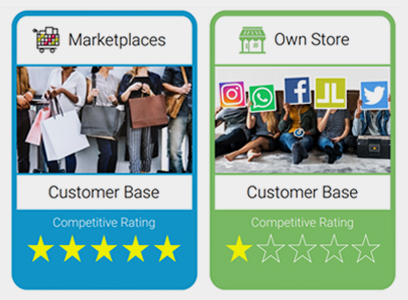
2. Competition
Marketplace: On a marketplace, customers are shown temptations in the form of your competitors’ products, often by the marketplace themselves. Well, that makes sense from the marketplace point of view. They want a sale; it doesn’t matter if it’s from your store or your competitors. You might not have to worry about SEO but will have to worry about how to rank higher in the marketplaces algorithm so as to beat your competitor for eyeballs.
Own e-commerce store: With your own e-store, you are not stacked against your competition. Your products don’t have to suffer undercut deals making your competitors product looks cheaper. There is no competition. People come to your store as they like it and are not tempted with other products once there.
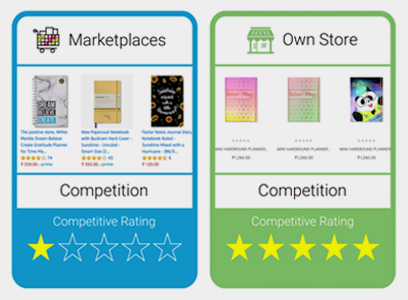
3. Investing in marketing strategies
Marketplace: Marketplaces invest significantly in marketing, with established SEO reputations for the product category pages.
Own e-commerce store: This is not the case for own online store and you have to be creative in your marketing approach, the longer term gains of this investment are way higher.
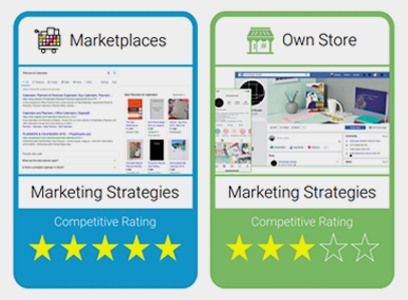
Also read: 5 proven strategies to boost your e-commerce sales
4. Ease of use
It’s a draw here! Both marketplaces and own online stores are easy to use. While selling on marketplaces require less work (create account and complete set up page) going through an e-commerce platform like LINKER.store, has made setting up of an online equally easy. Online stores have clean, clear designs and tons of real time assistance, and super easy navigation.
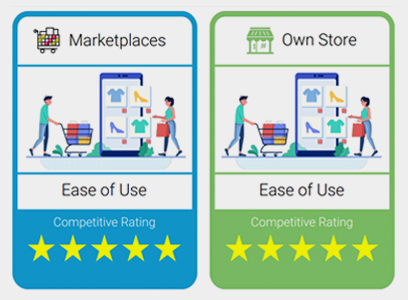
5. Design flexibility
Marketplace: It is simple to list your products on marketplace because these come with design restrictions. You can add images and descriptions, but the overall layout is that of the marketplace’s cookie cutter approach. Your brand lands up being a footnote.
Own e-commerce store: Setting up your own online store with a platform gives you a lot of design flexibility in design and layout, because why not! It's your product, it's your store. Most online store platforms will have many layouts for you to choose from to customise to your brand. If you are looking at differentiating in a crowded space, then this is your best bet.
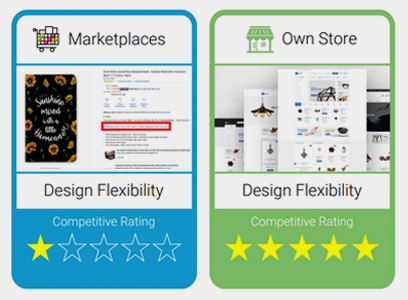
6. Payment and fees
Marketplace: Marketplaces charge fees, commissions, and these charges vary and can be altered anytime. And it's important to also look deeper than just the upfront costs. Before you know it, transaction fees, packaging costs, return costs and other charges can add up quickly eroding your bottom line.
Own e-commerce store: Payments and fees are transparent on online stores. Specially LINKER.store which is entirely free.
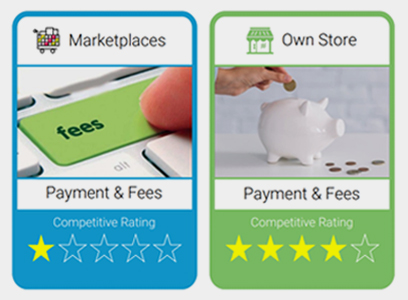
7. Algorithms and ranking
Marketplace: This one might not seem like a big deal but it is. How your product is placed on the algorithm or the marketplace basically decides how often customers see it. Imagine you sell vitamin supplements online only. Now suddenly the marketplace decides that they will no longer offer any supplements to their customers. Puff! Suddenly you are left with no sales channel. You might think this does not happen, but many a time you will hear of seller being exasperated as their product or product pictures don’t get approved by the marketplace lengthening the process or putting it into question completely.
Own e-commerce store: With your own store, of course you still play the game of the algorithms on search engines, SEOs, key words, etc. but once you master that, there is no stopping you and the store.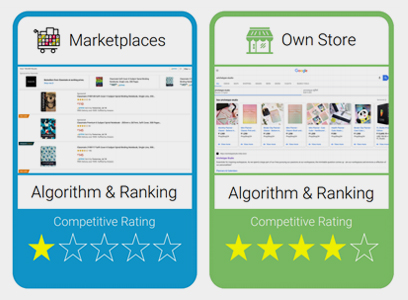
8. Own the customer base and insights
Marketplace: This is the most critical differentiator. You don’t own the customer base and insights. it means you could be missing out on huge revenue opportunities like special promotions, altering customers of an upcoming sale and basically building trust. Also, you have no customer insights regarding cart abandonment, their shopping patterns, spending, etc.
Own e-commerce store: On your own online store, once you build a customer base, you could run special promotions like special packages and discounts for Diwali, special promo codes for birthdays etc.
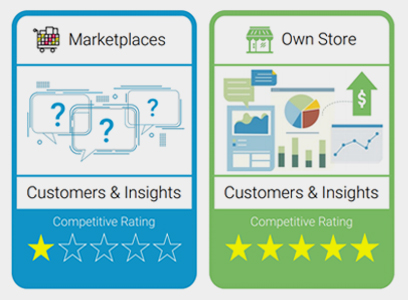
9. Generating B2B sales
Marketplace: B2B sales provide predictability and stability. Only selling through marketplaces wipes out an entire potential business opportunity out of the window.
Own e-commerce store: If a potential B2B buyer is looking for your products, the chances of them contacting you through your own online store is higher than through retail listings on marketplace.
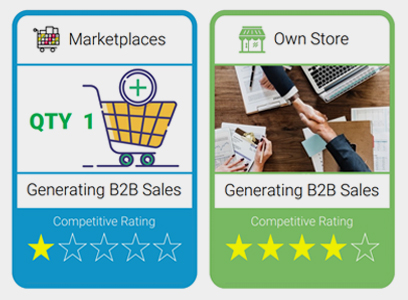
Takeaway
It is not an either or scenario. Selling on marketplaces and your own websites both has their benefits. When used together in fact they can magnify profits and complement each other very well.However sometimes keeping your goals in mind, might help decide what you should start first. It's always important to know where you want to use your time and resources.
Do you have a short-term goal or long term? Usually if it’s just a short-term goal, going via a marketplace is the more prudent thing. But if you are looking into securing the future and getting more shares of your profits, owning a website is the only way forward.
The other thing to keep in mind is your product. Is your product distinctive? Is it easy to differentiate your brand in a sea of others? If yes, then selling on your own website will be more profitable. However, if you are selling more commoditized products like DVDs or plastic cups, then a marketplace might be preferable.
Regardless of what you use, I would like to end by saying there is no better time than now to venture into the online world of selling. It might seem overwhelming at the onset but remember it is technically simple and the entry costs are the lowest than it has even been.
You can catch my webinar on selling online: Marketplaces or Own online store? presented on 18 July 2019 here.
Also read: E-commerce business in India: Predicting trends and analysing laws
Network with SMEs mentioned in this article
View Summi 's profile
Other articles written by Summi Gambhir
How SMEs can succeed in a digital world
320 week ago
Most read this week
Trending
What is BRC in Export Business?
Export Sector 2 week ago

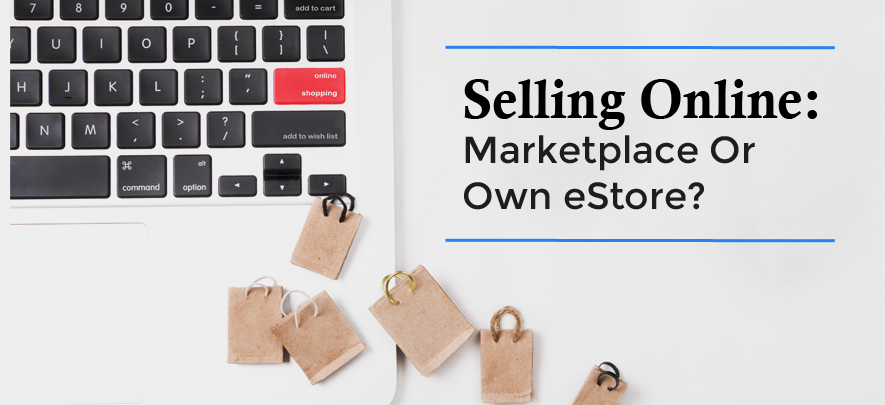















Comments (4)
Share this content
Please login or Register to join the discussion